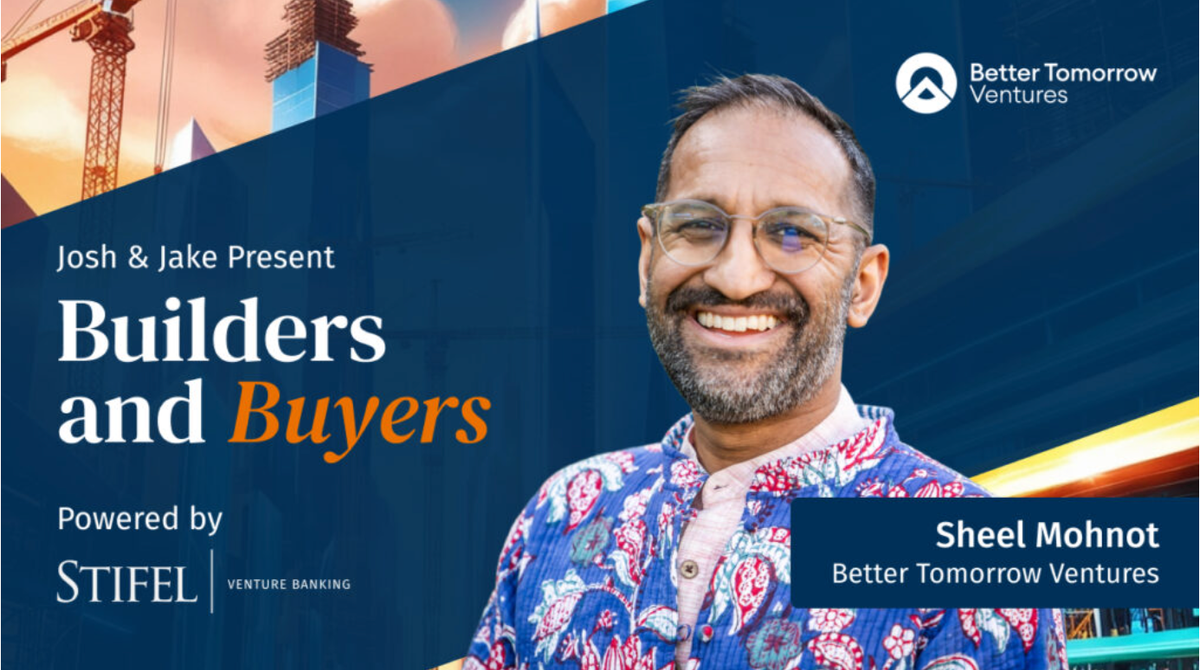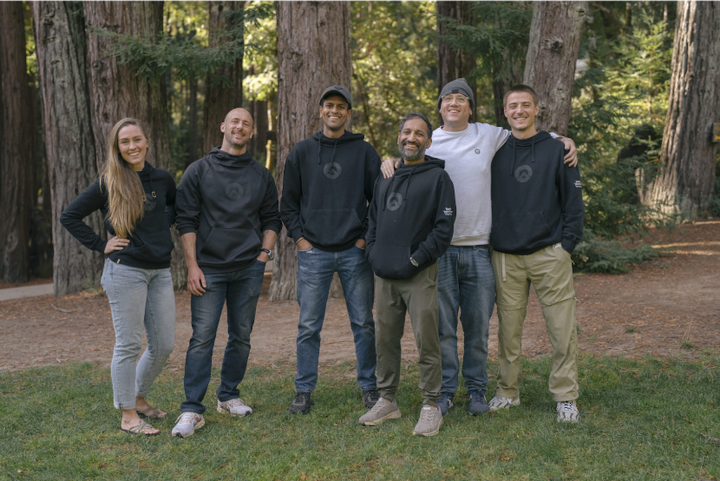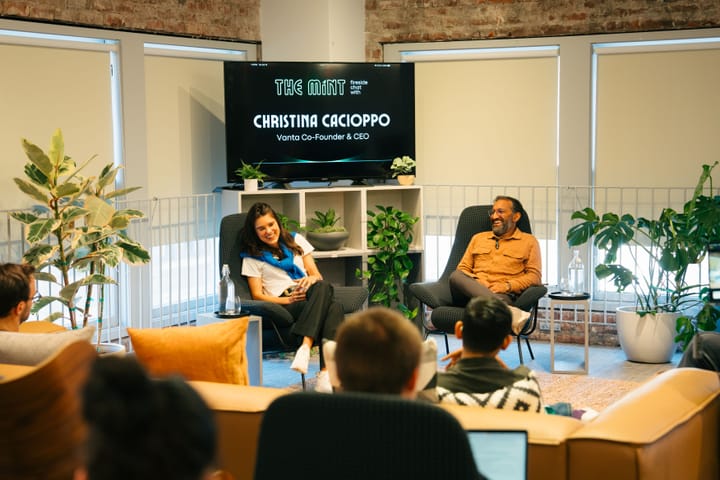Builders & Buyers: Sheel Mohnot on AI, Authenticity, and the Future of Fintech

Builders & Buyers is dedicated to showcasing leading figures in the fintech industry and their contributions. Through candid and in-depth conversations, Stifel Bank's Managing Directors, Josh Dorsey and Jake Moseley, aim to connect audiences with the thought leaders driving the future of finance. The series will explore personal journeys, company building, investing strategies, and topical macroeconomic conditions.
Notes from Josh Dorsey, conversation moderator:
There's no one quite like Sheel Mohnot, co-founder and partner at Better Tomorrow Ventures. I recently had the pleasure of sitting down with him for this edition of Builders & Buyers, and the conversation did not disappoint. Sheel is the rare kind of investor who's as comfortable unpacking why services-as-a-software is having a moment as he is recounting his Taco Bell Metaverse wedding (true story).
What really stayed with me after our chat wasn't just the level of his expertise–it was his energy. Sheel brings a contagious enthusiasm to the earliest stages of company-building. He's all-in on backing bold founders, not just bold ideas, and it's clear he thrives in the chaos and creativity of zero-to-one.
We covered a lot: what's next for fintech, how AI is actually speeding up everything (even for non-AI companies), and why authenticity–online and off–can be a competitive edge. Sheel's optimism is grounded, his insights are sharp, and his joy for the work is real.
I hope you find this one as fun as I did.
At a glance:
- Name: Sheel Mohnot
- Firm: Better Tomorrow Ventures
- Role: Co-Founder, General Partner
- Favorite book: Ender's Game by Orson Scott Card
- Fun fact: "If I wasn't in fintech or venture capital, I think I'd want to be a travel influencer. It's probably what I'd enjoy the most. I really love traveling, exploring different cultures, and meeting new people. I don't know how I'd stand out–probably wouldn't have any groundbreaking ideas–but I'd have a great time doing it."
Josh: Let's start with something fun. If I Google "Sheel's Taco Bell Wedding," I get back an entertaining story. Most folks reading this should look it up. Can you give us the quick version? What was the experience like, and what did it teach you about the potential of virtual worlds for real-life events?
Sheel: I'm a huge Taco Bell fan. I'm probably more of a fan of the brand than the food itself. Growing up as an Indian immigrant and a vegetarian, Taco Bell was our go-to fast food. It was cheap, spicy, and vegetarian-friendly–what more could you want?
Then there came this contest–they were offering a Metaverse wedding. It was right after we got engaged, and everyone started tagging me like, "Sheel, this is perfect for you." So, I brought it up to my wife as a joke, fully expecting her to shoot it down.
But she didn't. She said, "Okay, let's make a 2-minute video and apply." So we spent about 15 minutes putting something together and submitting it, thinking we'd never hear back.
But then, they chose us. At first, we actually said no. A Taco Bell-sponsored metaverse wedding? That's not exactly what we had in mind. But then they got us on a Zoom with their CMO and a few other folks. They pitched it hard. They said, "You'll be part of the Taco Bell family." And we thought–okay, that actually sounds kind of fun. So we went for it.
When they were planning this, the Metaverse was still hot. But by the time it happened, no one really cared about the Metaverse–including us. It ended up just being a fun virtual event. Many friends who wouldn't have been able to come to an in-person wedding could join, including family in India who couldn't travel because of visa issues. That part was really cool.
That's amazing. Do you think there's a place for virtual events like that going forward?
It's tough. I love connecting with people in person–there's no real substitute. Hopin–the virtual event platform–got up to a $7.5 billion valuation during COVID, then cratered. So, I don't know if virtual-only events are the future, but they're definitely useful. It's easier than hopping on a plane.
Let's back up a bit–you grew up in Pittsburgh and attended school there. How did you end up in Silicon Valley?
I grew up in Pittsburgh and stayed local for college at Carnegie Mellon, where I built software for hospitals. After that, I took a consulting job at BCG in Chicago. While there, a friend approached me about starting a company together–a payments startup called FeeFighters. I decided to go for it. When FeeFighters was acquired, the acquiring company asked us to relocate to San Francisco. At first, I wasn't sure about it–but I made the move. And looking back, it was an amazing decision. I probably wouldn't be a VC today if I hadn't moved.
In the beginning, I split my time between Chicago and San Francisco–I even held on to my apartment in Chicago because I loved the summers there. But eventually, I realized I had to be in one place, and that place was San Francisco.
Can you talk a bit about your time at FeeFighters and Innovative Auctions? What did you learn from those startups?
FeeFighters mainly focused on small businesses and startups, while Innovative Auctions had a much more enterprise-driven sales motion. They were very different companies, but what I loved about both was the same: talking to customers, getting feedback, and iterating on the product. That was always my favorite part.
I still draw on those experiences when I work with founders today. They taught me the importance of building for a specific customer–once you've clearly defined your ideal customer profile–because you can't build for everyone.
I still draw on those experiences when I work with founders today. They taught me the importance of building for a specific customer–once you've clearly defined your ideal customer profile–because you can't build for everyone.
After those startups, you moved into VC–starting at 500 Startups. When did you know you wanted to become a professional investor?
The seed was planted back at FeeFighters–I actually enjoyed the fundraising process and talking to VCs. This was around 2010-2011 when raising meant making the rounds on Sand Hill Road.
After we were acquired, I started angel investing and realized that I really loved working with founders at the earliest stages. When I exited my second company, I joined 500 Startups. They had invested in FeeFighters, so a relationship was already there–it felt like a natural next step.
Eventually, I co-founded Better Tomorrow Ventures with Jake, my current partner. I liked the idea of doing our own thing.
You're super active on social media, and your posts are always a great mix of fun and thoughtful. How intentional are you about shaping your online persona, or does it come more naturally?
It's definitely not strategic. I've never sat down and planned out what I post. Sometimes, I wonder if I should, but I think that would risk losing what makes it work–what makes it feel genuine.
I'm pretty much the same person online as I am offline. Some people have a different persona, but social media is just an extension of who I am. I'm curious, I like learning, I like connecting with people, and I'm an extrovert–so during the pandemic when I was craving human interaction, social media became that outlet.
You say it's never been strategic, but your posts still come across as thoughtful–like when you summarize articles or highlight ideas.
In those moments, it's part instinct and part memory trick. When I read something interesting, I want others to see it too–but sharing it also helps me remember.
Summarizing forces me to slow down, reflect, and internalize the key points. That practice has actually made me a better writer. I was never a strong writer, but trying to fit thoughts into 280 characters makes you prioritize what really matters.
Do you encourage your portfolio founders to build a brand online?
Only if it's authentic to them. Most of our founders aren't super active on social–and that's totally fine. They've got businesses to run. I always tell them, "If it feels good, do it. If not, don’t.” It has to come from a real place. You can spot a ghostwriter from a mile away.
Most of our founders aren't super active on social–and that's totally fine. They've got businesses to run. I always tell them, "If it feels good, do it. If not, don’t.” It has to come from a real place. You can spot a ghostwriter from a mile away.
That said, having a social presence has helped our portfolio–customers, hires, and partners have come through those channels. I wasn't doing it intentionally at first, but looking back, I can see the value it's created.
Can you provide a quick overview of Better Tomorrow Ventures?
Better Tomorrow Ventures–BTV–is about five and a half years old. We focus exclusively on pre-seed and seed-stage fintech companies. The team is small and tight-knit: four investors and two non-investors. All four of us come from founder or operator backgrounds, and that really shapes how we work with companies.
We aim to be founder-first, responsive, and genuinely helpful. Since we focus solely on fintech, we can bring a lot of leverage–things like bank partnerships, vendor intros, and hiring support. For example, we have Yoni on the team as a full-time, in-house recruiter, dedicated to helping our portfolio companies hire.
Tell me about The Mint program–that's something new, right?
The Mint is our pre-seed program. It's similar to an accelerator, but it's much more hands-on. We invest in 5 to 8 companies at a time, and they work out of our office. We're there every day–whiteboarding, giving feedback, helping them build.
The idea actually came from my time at 500 Startups. We saw great results with that model and thought we could make it even stronger by going deep into fintech.
We're currently on our fourth cohort. The first three were in San Francisco, but this one's in New York–I'm actually here right now for it. It's intense and a big time commitment, so we're always evaluating the ROI. But so far, the results have been really strong.
You've mentioned fintech feels like it's heating up again. What do you think is driving that? Interest rates haven't really dropped, so what's the shift?
I actually think we're just returning to the long-term trend line. For about 15 years, fintech was on a steady upward trajectory. Then 2021 hit–things got way overheated: too much money, sky-high valuations. What followed in 2022 and 2023 were overcorrections. In 2024 and especially 2025, we're just getting back on track.
Some of the companies are really performing again. 2024 was a strong year for our portfolio after a tough 2023. Honestly, in many cases, the overfunding that happened in 2021 made things more complicated, not easier. You had a lot of companies doing the same thing–strong teams, lots of money–but no one breaking through.
Now that some of that noise has cleared–through shutdowns or consolidation–we're seeing real momentum.
When you say your companies were successful in 2024, do you mean they were just healthier overall?
Yes. A lot of it was about survival. We told founders, "Just make it through." If you could weather the storm, good things would follow–and in many cases, that's exactly what happened.
Many companies we were unsure about in 2023 turned into beasts in 2024. They found new traction once things stabilized.
Has that resurgence changed how you're thinking about investments?
It's reaffirmed our approach. We stayed disciplined through the hype cycles–we didn't chase trends just for the sake of it. Now, that's paying off.
We stayed disciplined through the hype cycles–we didn't chase trends just for the sake of it. Now, that's paying off.
We're still laser-focused on early-stage fintech, and we're finally seeing more differentiated ideas again–not just another wave of me-too startups. We're leaning into sectors like accounting automation, underwriting, and embedded fintech–areas where we have expertise and can move the needle.
In your future vision, how will AI-driven fintech change how we live and interact with money? What excites you most–and what concerns you?
I have so many thoughts on this.
It's clear people need help managing their money–and AI is incredibly well-suited for that. You're dealing with messy, unstructured data coming from all over the place. AI can organize it, apply logic, and surface useful insights. That's a dream use case.
What excites me is the idea of a system that plugs into everything–your email, investments, K-1s–and just tells you what to do. I don't think we're far off from that. We haven't found the company doing it right yet, but it's very top of mind.
Where we've actually invested in AI so far is more in what we call "services as software"– or what one of our portfolio companies calls "results as a service." It's not about selling a tool–it's about selling the outcome. Two examples: Basis automates the work traditionally done by junior accountants, and Layer plugs into vertical SaaS platforms, like Toast, to automate bookkeeping.
Do you think the current AI hype cycle is overblown?
In some ways, yes–especially with the ultra-hyped companies that went from $0 to $10 billion in two years. I worry about how much of that revenue is real, how much is experimental, and how sticky it actually is. If there's no moat and no stickiness, that's a big risk.
But overall, I'm more bullish than not. Even our non-AI companies are benefiting massively from AI. Deck.co is a great example. The founders had previously built Flinks–basically Plaid for Canada. With Deck, they're doing something similar for utility data and other verticals. Thanks to AI, they're building integrations 70x faster.
They told me about a Friday call with a customer who needed specific integrations. They didn't have any of them. But by Monday, they had them built and demo-ready. A few years ago, that would've taken six months.
That's the kind of acceleration AI is enabling. And that's what we're seeing across the board. AI is making everything faster, leaner, more scalable. You don't have to be building AI to benefit from it.
AI is making everything faster, leaner, more scalable. You don't have to be building AI to benefit from it.
How do you weigh a fintech startup's team versus its technology when deciding to invest–especially at the seed stage, when both are still evolving?
At the earliest stages–especially pre-seed–the team matters most. The product will change, the tech will pivot, but the founders are the constant. In fact, if I look back at the five best companies we invested in during my time at 500 Fintech, three of them were pivots. So, if we had invested purely because we loved the initial idea, we would've been wrong.
At the earliest stages–especially pre-seed–the team matters most. The product will change, the tech will pivot, but the founders are the constant.
What made those companies successful was the founders. They moved fast, iterated constantly, and had the grit to break through walls–to win that first customer, to survive tough moments, to keep going when others would fold.
So yeah, we always start with the same question: "Is this team exceptional? Will they figure it out?"
I know you travel a lot–and I believe you've invested in founders across different countries. Have you seen any patterns in what makes a successful founder?
I've traveled a lot, and while I haven't met founders in every place I've visited, I've met quite a few around the world. The core traits of great founders–tenacity, speed, execution–are universal. But how those qualities show up can vary a lot, depending on the region.
Because I come from a fintech lens, I think a lot about trust. In fintech, trust is everything–especially in emerging markets, where people tend to be more skeptical, and systems are less stable.
In those environments, founders often have to take very different approaches. Some might rely on in-person onboarding, which wouldn't scale in the U.S. Others borrow credibility by partnering with celebrities or public figures, because that's who people trust. They also have to navigate constant volatility, such as governments freezing online payments, local currency collapsing, or even dealing with corruption, and find workarounds.
So, while founders everywhere need resilience, an extra layer of unpredictability in emerging markets often makes the job harder–and more impressive.
You've talked about having investing themes. How do those themes materialize? Does it start with a hunch and then move into research–or do the founders lead you there?
I'd say we're more opportunistic than strictly thesis-driven. We definitely have ideas we like–and others we tend to avoid–but we try to stay open. A great founder can pull us into a space we weren't actively exploring. It's less about having a perfectly defined thesis and more about being persuaded by a founder's conviction and insight.
A great founder can pull us into a space we weren't actively exploring. It's less about having a perfectly defined thesis, and more about being persuaded by a founder's conviction and insight.
That said, there are a few themes we've built strong conviction around and consistently invested behind.
We talked about one earlier: "services-as-a-software" or "results-as-a-service." Another big one for us is embedded fintech, which integrates financial products directly into vertical SaaS platforms. That's a space we've invested in quite a bit.
But often, it starts with someone building something interesting. If we believe in them, we'll dig in and follow the idea wherever it leads. The best founders tend to guide us to the right place.



